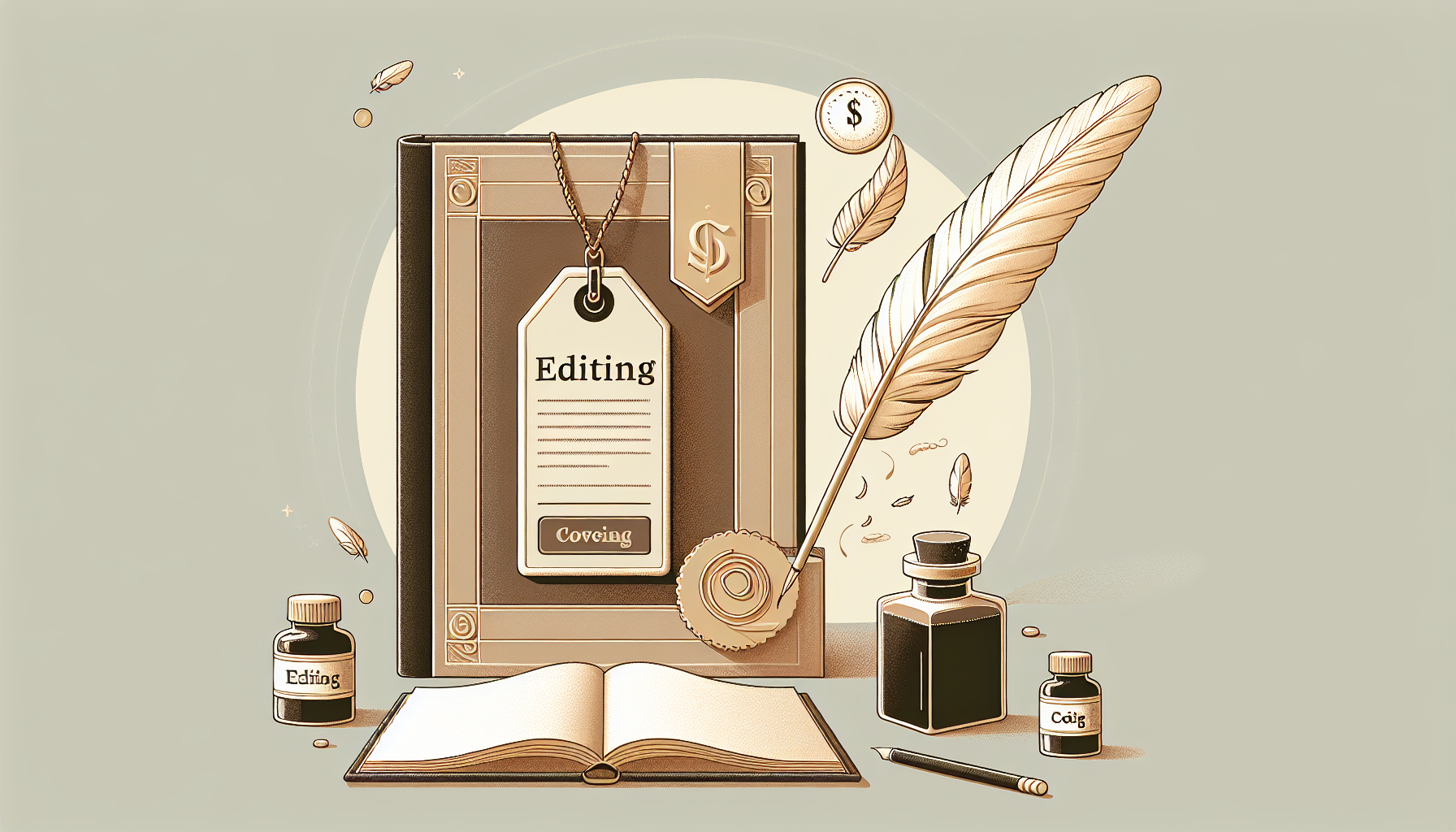Are you thinking about writing a book but worried about the costs involved? You’re not alone! Many aspiring authors wonder just how much they’ll need to invest, and let’s be honest, the expenses can add up faster than you can say “best-seller.”
But don’t fret! If you stick with me, I promise to break down the various costs related to writing a book, from pre-writing expenses to publishing fees. We’ll tackle everything you need to know without overwhelming your wallet.
In this guide, we’ll explore the price tags attached to research materials, editing services, and even marketing efforts. So grab your pen (or keyboard), and let’s dive into the world of book-writing costs!
Key Takeaways
- Writing a book involves multiple phases: pre-writing, writing, editing, design, publishing, and marketing.
- Costs vary based on book type; research-heavy works and cookbooks tend to be more expensive.
- Pre-writing expenses may include research materials and writing courses.
- Editing can cost between $0.01 and $0.08 per word, depending on the type of editing needed.
- Professional cover design may range from $150 to over $2,000; formatting costs vary for e-books and print.
- Both traditional and self-publishing have costs; agents usually take a percentage of your earnings.
- Self-publishing means covering most costs but retaining full rights and profits from your book.

Understanding the Costs of Writing a Book
Writing a book can be a fantastic journey, but it often comes with a hefty price tag.
From research materials to marketing expenses, understanding the costs involved can help you budget wisely and avoid any nasty surprises along the way.
Overview of Book Writing Expenses
First things first: let’s break down the major expenses you’ll likely encounter on your path to authorship.
Generally, the costs can be divided into different phases: pre-writing, writing, editing, design, publishing, and marketing.
Each phase brings its own set of costs, and being aware of these ahead of time can help you plan better.
Different Types of Books and Their Costs
Not all books are created equal, and neither are their costs.
For instance, a straightforward self-help manual might cost less to produce than a heavy, researched academic work.
Fiction usually requires substantial world-building and character development, which can lead to additional costs in research or hiring professionals.
If you’re penning a cookbook, ingredient testing and photography can throw your budget off balance quicker than you think!
Understanding the type of book you’re writing helps you estimate the necessary resources accurately.
Pre-Writing Costs
Research Materials and Resources
The foundation of a great book starts before you even put pen to paper.
Research materials can include anything from books to articles, and even interviews with experts.
Library memberships and online databases might be worth considering if you plan to conduct extensive research.
Writing Courses and Workshops
Your writing could always use a little sharpening, right? Investing in writing courses or workshops can provide valuable guidance.
It may feel like an added expense, but think of it as a long-term investment in your writing career.
Many platforms offer online courses, often at reasonable price points, which allow you to learn from experienced authors and industry professionals.
Platforms such as Coursera or Udemy can be fantastic resources!
Software and Tools
Let’s talk tech! Writing software can streamline your process and improve your productivity.
Popular tools like Scrivener or Google Docs can make everything from organization to collaboration a breeze.
However, keep in mind that some of these tools come with subscription fees.
Investing in the right software may save you both time and potential headaches in the long run.
Writing Costs
Time Investment
Let’s get real: writing a book is a time-consuming endeavor!
You need to consider the opportunity cost involved: the hours you could’ve been earning money in a different job or the time spent on leisure activities.
This investment of time can be substantial, so be prepared to allocate it wisely regarding your personal circumstances and schedule.
Hiring a Ghostwriter
If time is money and you feel overwhelmed, hiring a ghostwriter might be your saving grace.
Ghostwriters can handle the heavy lifting in terms of writing, allowing you to focus on your vision.
However, be prepared to shell out serious cash, as qualified ghostwriters can charge anywhere from a few thousand to tens of thousands of dollars.
Don’t forget to vet potential ghostwriters; reviewing samples of their work can help ensure they align with your writing style!
Writer’s Block and Productivity Tools
It’s a writer’s worst enemy: writer’s block. But fear not, there are tools to help conquer this beast!
Platforms like Focusmate connect you with accountability partners, providing structured writing times to get those creative juices flowing.
Additionally, there are apps such as Forest that promote focus while keeping you off your phone.
Taking the time to invest in productivity tools can save you from those frustrating blank pages.

Editing and Proofreading Costs
Types of Editing Services
Editing is where the magic really happens, transforming your first draft into a polished gem.
There are several types of editing services available: developmental editing, line editing, and copy editing.
Developmental editing focuses on the big picture, like structure and content, while line editing hones in on flow and style.
Copy editing, on the other hand, deals with grammar and punctuation, ensuring your prose is clean and professional.
Average Costs for Different Editing Levels
The costs of these editing services can vary widely based on the type and level of editing required.
On average, a developmental editor might charge anywhere from $0.03 to $0.08 per word, which can quickly add up!
Line editing generally lands in a similar range, while copy editing tends to be slightly more affordable, averaging around $0.01 to $0.04 per word.
Keep in mind that the costs can also depend on the editor’s experience and reputation, so it pays to shop around.
Proofreading Expenses
Proofreading is your final defense against typos and inconsistencies before you hit publish.
This stage is typically less intensive than editing, meaning it can be more budget-friendly.
Proofreaders often charge around $0.01 to $0.03 per word, ensuring your manuscript is accident-free.
Consider hiring a professional proofreader who specializes in your book’s genre for the best results!
Design and Formatting Costs
Book Cover Design
Never judge a book by its cover, right? But let’s be honest, a stunning cover design can make or break your book’s appeal!
Hiring a professional designer could run you anywhere from $150 to over $2,000, depending on complexity and designer expertise.
Investing in a good cover not only captures attention but also sets the tone for the reading experience.
Interior Formatting and Typesetting
Interior formatting ensures your book looks as good on the page as it does on the cover.
This includes everything from choosing fonts to structuring chapters and page layouts.
Hiring a professional can cost anywhere from $200 to $1,500, depending on page count and specific formatting needs.
However, if you’re on a tight budget, there are tools like Reedsy that offer templates to help you format your book at little to no cost!
E-book vs. Print Design Costs
Publishing an e-book is generally cheaper than print, but both have their own unique design considerations.
E-books may require less formatting, while print versions demand attention to bleed, layout, and trim sizes.
Expect to pay around $100 to $500 for e-book formatting, and substantially more for print, as it includes additional design complexities.
Publishing Costs
Traditional Publishing Expenses
Traditional publishing often seems like the dream, but there are costs involved, even if they’re not always out-of-pocket.
For example, agents typically charge around 15% of your earnings, so it’s important to factor this into your budget.
Additionally, some publishing houses may have specific fees for editing, marketing, and distribution that can influence your financial planning.
Agent Fees
Before you land a publishing deal, hiring a literary agent can be a significant financial commitment.
While reputable agents don’t take upfront fees, you should expect to share a percentage of your earnings for their hard work!
Publisher Fees
Some publishers might charge fees for specific services, including editing, cover design, or marketing initiatives.
Understanding these costs upfront can help you make informed decisions and avoid surprises down the road.
Self-Publishing Costs
Self-publishing can be a liberating route, but you need to come prepared to bear the financial load.
Unlike traditional publishing, you’ll cover most of the costs, from editing to design and marketing.
However, the good news is you typically retain all rights and profits from your book, making it potentially more rewarding!
Platform Fees
Choosing to self-publish? Be ready for platform fees, which can range from $0 to upwards of $500 depending on the service.
Popular platforms like Amazon KDP or Smashwords make it easy to publish but may deduct a percentage of your sales.
Distribution Costs
If you’re aiming to get your book into bookstores or libraries, factor in the distribution costs.
These can add up quickly, potentially requiring an upfront investment and ongoing fees to keep your title available.

Marketing and Promotion Costs
Building an Author Platform
Establishing an author platform is key to promoting your book effectively.
This could mean creating a website, starting a blog, or developing a strong social media presence.
Budget for domain registration and hosting, which typically costs around $10 to $50 a year, plus any necessary marketing tools to help you reach your audience.
Don’t forget about professional photos and branding; they can provide credibility and make your platform more attractive.
Paid Advertising Options
If you want to give your book a real push, investing in paid advertising can be a game-changer.
Platforms like Facebook, Amazon, and Google Ads offer targeted options that can reach potential readers effectively.
Prepare to spend anywhere from $5 a day on ads to thousands for a comprehensive marketing campaign, depending on your goals.
Always test and optimize your ad strategies to ensure you are getting the most bang for your buck!
Social Media Marketing
Social media can be your best friend when promoting your book—if used wisely!
Engaging content on platforms like Instagram, Twitter, and TikTok can create buzz around your work.
Factor in costs for graphic design tools like Canva (free to premium options) to make eye-catching posts.
Remember, authenticity resonates more than perfection; be yourself and share your journey with your audience.
Miscellaneous Costs
ISBN Registration
Every published book needs an ISBN, a unique identifier that tells the publishing world, “Hey, I’ve got a book!”
Getting an ISBN can range from $125 for a single number to discounts when bought in bulk through services like Bowker.
Keep in mind, while self-publishing may offer free ISBNs, owning your ISBN gives you greater control over your book.
Legal Fees (Copyright, Contracts)
While it might sound a bit dull, securing proper legal protection for your book is vital.
Legal fees can include copyright registration, which can cost around $35 to $55, and contract help if you’re working with agents or publishing houses.
Consider investing in a legal consultation if you’re unsure about contracts or rights; it’s better to be safe than sorry.
Miscellaneous Supplies and Services
Finally, don’t forget to budget for various supplies and services that pop up during the book creation process.
This can include printing costs for promotional materials, business cards, or even software subscriptions for project management tools.
Staying organized and prepared will help you manage these incidental costs more effectively.
Conclusion
Total Estimated Cost Range
So, how much do you need to invest in writing a book? Well, it can vary widely based on the type and choices you make throughout the process.
On average, traditional publishing can cost upwards of $2,000, while self-publishing might start around $500 and go beyond $10,000 depending on your services.
Tips for Budgeting and Managing Costs
Here’s a tip: always keep detailed records of your expenses to avoid overspending and identify areas to cut back.
Invest in what matters—quality editing and cover design can lead to better sales, but don’t overextend yourself financially early on.
Plan, prioritize, and don’t hesitate to ask for help or advice when needed, as budgeting wisely can pave the way for your book’s success!
FAQs
The costs of writing a book can vary widely, including pre-writing costs, writing expenses, editing, design, publishing, and marketing. Each stage has specific fees that authors should plan for accordingly.
Hiring a ghostwriter can significantly ease the writing process, especially for busy individuals. While it involves additional costs, the investment often results in a polished book that effectively communicates your ideas.
Editing costs can range based on the type of editing needed—developmental, copyediting, or proofreading. Expect fees to fall between $0.01 to $0.05 per word, depending on the editor’s experience and the services provided.
To budget effectively, research costs for both traditional and self-publishing routes, including design, printing, and marketing. Set aside funds for promotional activities and platform building to maximize your book’s reach.
